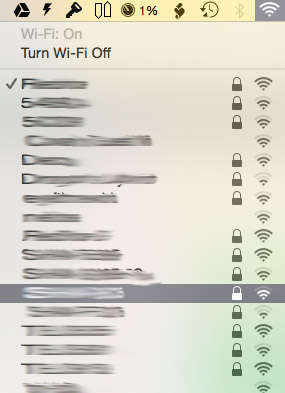If you want to save money on Internet fees, lowering your monthly expenses and possibly stop paying for the internet all together, here’s a tip that will not only lower your bills, it will also connect you with your neighbours and community.
I did a quick search, and lots of people suggest bundling your services, choosing a cheaper plan, complaining, threatening to cancel, or just getting rid of your service. Very few people suggest my favourite – sharing.
Save money on Internet fees by sharing your network
Have you ever noticed how many wireless networks there are in your neighbourhood?
I live in a small town, yet I can see over 20 unique wireless networks from my desk. The average Canadian spends $50-100 each month for home internet service.
So, I share my wireless network with 4 other neighbours.
Instead of all paying horrendous monthly fees for our own Internet connections, we all save money by sharing one account. One of us holds an account with our (profit-hungry) internet service provider (ISP), and simply shares the wireless network password (and thus their account) with the rest of us.
We each pay $20/month instead of $100/month.
We each save almost $1000 each year.
Screw The System, Save Your Money
Officially, buried somewhere in the 7,500 words of conditions my provider makes me agree to, I’m not allowed to share. Sharing with our community is explicit forbidden. This is true in a surprising growing number of contracts we sign these days.
Thanks to the near monopoly of Canada’s three telecom giants (who work desperately to stifle and destroy any competition) if you want internet access in Canada you have no choice but to agree to these terms and sign these contracts.
With no real choice, my ethics puts this on the side of extortion rather than customer service.
This is a perfect chance to practice some civil disobedience.
Beside saving money, this also forces me to trust and talk to my neighbours. That is never a bad thing. If the lights go out, your neighbours are the only people that can help you.
What are the risks in sharing the Internet?
There aren’t as many risks as people might assume. It’s interesting how many people resist the idea of sharing – but that’s our indoctrination into consumerism talking, not logic or wisdom.
So what are the risks?
Computer security? These days, computers are secure to most casual hacking. Computer viruses are a billion dollar industry so ignore the fear-mongering propaganda advertising. If you have a PC, keep your virus software up-to-date (that’s the only software upgrades I recommend) and, for Mac users as well, make sure your computer’s firewall is enabled.
Monthly overages? My neighbour could use more than their “fair share” of bandwidth and push us all over our monthly limit, but split 5 ways, the overage fee isn’t much. Besides, together we can easily afford the higher-priced, higher-cap plan. So far, 250GB/month has been more than enough.
The only other risk is finding out your neighbour doesn’t like you. Well, at least now you know.
Technical Details
How do I share my Internet Connection?
- Walk to your (immediate) neighbour’s houses and discuss this idea. Get to know them if you don’t – this is a great excuse to say hello
- Keep the Internet account for the house “in the middle” and share the network password with any neighbours within reach (the wireless signal may only reach to one or two other houses – walk around with a laptop to test the signal)
- Update the laptops and computers in the other houses to use the network of the middle house. Confirm all computers can connect to the network. If the houses are too far apart or don’t support wireless internet you might be out of luck.
- Disconnect the other Internet accounts, don’t tell the provider why, and save money!
Will Sharing My Connection Slow Me Down?
Theoretically, yes. More people on your network splits the bandwidth, however,
- All modern routers, can handle over 10 users without an issue.
- Most users aren’t online all the time
- Sharing costs means you can upgrade to a fast connection if needed and still save money
Will my ISP find out and disconnect me?
No. Their systems can not detect if computers on your Internet network are inside your house or not, despite what they may tell you. Secondly, thanks to their focus on profits, they would only threaten to cancel your account. They’ll still take your business if you mention switching to one of their competitors.
Why aren’t more people doing this?
Most people simply don’t know they can. No one profits from helping you save money, so those interested in sharing these money saving ideas can’t afford mailing campaigns, advertisements, or political lobbying.
Why are Canadian Internet costs so high?
Bell, Rogers and Telus all claim the Canada’s relatively small population on a large land mass forces them to invest more than most of their international competitors to build our national infrastructure. The argument doesn’t stand up to scrutiny when compared to international providers, surprise surprise. So why do the Big Three charge us so much? Because they can. They have bought up and shut down all their competitors. Profit. Capitalism 1.0 at work.
Meet Neighbours, Screw System, Save Money
This is simple, free, and can save you a bundle. If you look at your monthly and living expenses, how else can you share to save money? Tool sharing? Car shares? Discuss below.
 Promoting World Peace ⊣ "Capitalism 2.0" | I’m No Expert Isn't it time we all got along? Promoting World Peace, Capitalism 2.0, Social Enterprise, co-operation, optimism, forgiveness and an eye to our collective future
Promoting World Peace ⊣ "Capitalism 2.0" | I’m No Expert Isn't it time we all got along? Promoting World Peace, Capitalism 2.0, Social Enterprise, co-operation, optimism, forgiveness and an eye to our collective future





